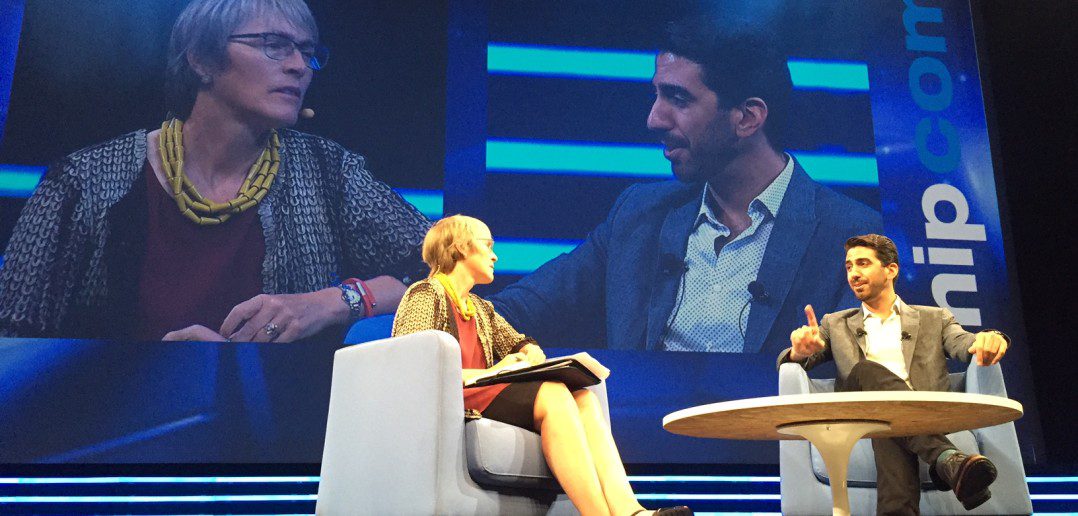In his media mastermind keynote, Fullscreen CEO and founder George Strompolos devoted a charged half-hour to outlining the company’s forthcoming services, what differentiates them from the market, and what it’s doing for content creators. In the above photo, he is pictured with journalist Kate Bulkley, who asked him a few brief questions after the session.
Strompolos began by saying Fullscreen was born at the eve of a content creation revolution, catalysed by an evolution in hardware, the emergence of smartphones, and fast internet.
« These are elements that have been revolutionary to online creators and youth audiences. People have been creating for hundreds of thousands of years, but these changes have made it possible for a new creative class to emerge, » he said.
« Fullscreen is in the business of developing online creators from start to startup. Together we programme premium entertainment experiences. »
And the company is going one step further with two major releases, targeted to men and women, respectively, in the juicy teen-to-young-adult demographic.
According to Ypulse, in response to the prompt « Online celebrities are my friends », 56% of 13-17-year-olds responded positively, in addition to 41% of 18-24-year-olds. Compare that to their feelings about Hollywood celebrities, which they say « ‘are cool, but I don’t consider them my friends,' » said Strompolos.
Predictably, TV watching between 18-24-year-olds has decreased by 37%.
« But they still love stories, » said Strompolos. « These young audiences are driving the primary OTT platforms we know and love »: They compose 35% of pay TV audiences, 51% of Netflix audiences, and 42% of Amazon’s.
Which leads to how Fullscreen is planning to laser-focus on this rich demographic: with « two services, Fullscreen and Rooster Teeth, serving young adult audiences, one female side and one male side, » Strompolos said. « We’re tapping into our roots and getting into the business of bringing a premium experience directly to consumers. »
To start with, there’s Rooster Teeth, which Fullscreen owns. Based in Austin, Tx., the production company has existed for 12 years and is responsible for Red vs. Blue, a comic web series whose 13th season came out this year and was recently licensed by Netflix. It currently produces over 40 original videos per week.
Rooster Teeth is approaching 20M subscribers, fans, and followers across social media. « They put up viewership which rivals some of the biggest media companies and brands in the world, » said Strompolos. « They really capture that male demographic that loves video games, comedies, being silly. »
And alongside Rooster Teeth, « we’re releasing our first feature film in Q1 next year, » Strompolos announced. The film is Lazer Team, « a classic save-the-world idiot story. »
He added with pride that Nerdist said « It has the look and feel of a lost Spielberg film »—but, more interesting than that, it was primarily crowdfunded. Its original ask on Indiegogo was $500.000; in just two days the creators raised just shy of $3M, « setting a record for the highest crowdfunded original IP in the world, and smashing all Indiegogo records. »
« We think Lazer Team will be one of the next vehicles that expand our audience beyond the 19M we have today, » said Strompolos.
Rooster Teeth also has its own OTT, targeted to 60% males between 18 and 45 years old. It costs about $5 per month.
Its latest series production is RT-ES, or Rooster Teeth Entertainment System, hosted by Colton Dunn, a Key & Peele writer.
« It’s taping its second episode today, » Strompolos said. « We stream it live on the service; it’s available on-demand to subscribers thereafter. » All programming for Rooster Teeth is produced in-house, which has become crucial to brand values and also speeds up the distribution. Everything is global by default on day one.
Rooster Teeth’s other recent productions include Day 5, which Strompolos describes as « a story about something that happens out of nowhere, where everyone who is asleep, or falls asleep, dies. It’s a genre take on what people need to do to survive. The story begins on day five of this epidemic. »
Then there’s Rwby, an American anime series that is going into its fourth season. « It’s about a school for young assassins and is doing incredibly well, » said Strompolos. « It was recently licensed to television in Japan, making it the first US-produced anime series to be televised in Japan. »
As noted at Rooster Teeth’s own RTX convention, its popularity inspires a number of cosplay attendees.
Strompolos’s other announcement was for Fullscreen’s SVOD service, which debuts in early 2016. « We haven’t yet announced the price but it’ll be a low-cost subscription service, » he said.
Fullscreen streaming is meant to take advantage of a number of crucial trends: Female fans drive much of the success of groundswell creators, so its original works will be targeted to 60% women and the 13-30-year-old age group.
« We’ll be producing as well as licensing original content, but really going after a particular audience, » said Strompolos.
By design, Fullscreen’s stories span multiple social platforms. « People talked about that for 10 years as transmedia, but it’s really starting to be something that’s possible, and it’s fun to do, » said Strompolos, who added that both Fullscreen and Rooster Teeth are targeting a demographic where 80% of the content they consume is via mobile.
When Fullscreen goes live, it will feature three titles. The first is Electra Woman and Dyna Girl, coproduced with Legendary Pictures, and featuring famous content creators like Grace Helbig, who made her start on YouTube. The work is « a comedy about small-town superheroes trying to make it in a bigger world » and follows two small-town superheroes who move to the big city to fight bigger crimes… and bigger villains.
Then there’s The Outfield, featuring Cameron Dallas and Ash Greer, « two of the most influential young males in the world today, » Strompolos said. « It’s a coming-of-age story about three high school seniors and the trials and tribulations they deal with, growing up in a small town. » He added that it feels a lot like Friday Night Lights.
Lastly, there’s Pretty Little Teens, « a spoof on all the teen dramas we’ve seen and grown to love or laugh at. It’s a focus on the young adult audience, that time where you’re coming of age and defining who you are. This audience is largely underserved, particularly in the OTT world, » he added.
« We’re doing something that’s a combination of online and theatrical. We have some interesting partners that will turn some heads when we announce them. »
Fullscreen’s approach is strong, he said, because it is both personal and immersive. « The stars we groom are personal and connect with their fans. They use social media to develop that friendship. But it’s also personal in the way you consume: It’s meant for me. »
He added that individuals drive this new, personality-driven medium.
Platforms claim to be « in the business of serving everyone, » Strompolos said. « A lot of people launch services today that are intended for everyone but aren’t prepared to spend the billions of dollars it takes. »
In the subscription world, he later told Bulkley, « a lot of these services are kind of boring. I don’t see a lot of innovation there. »
The offerings are also great advertising-candy. « We can offer something unique to advertisers that they can’t get in other places, » said Strompolos, adding that creators also profit from the special collaborations they cultivate. « We’re able to pipeline that into premium content, and make it unique. »




